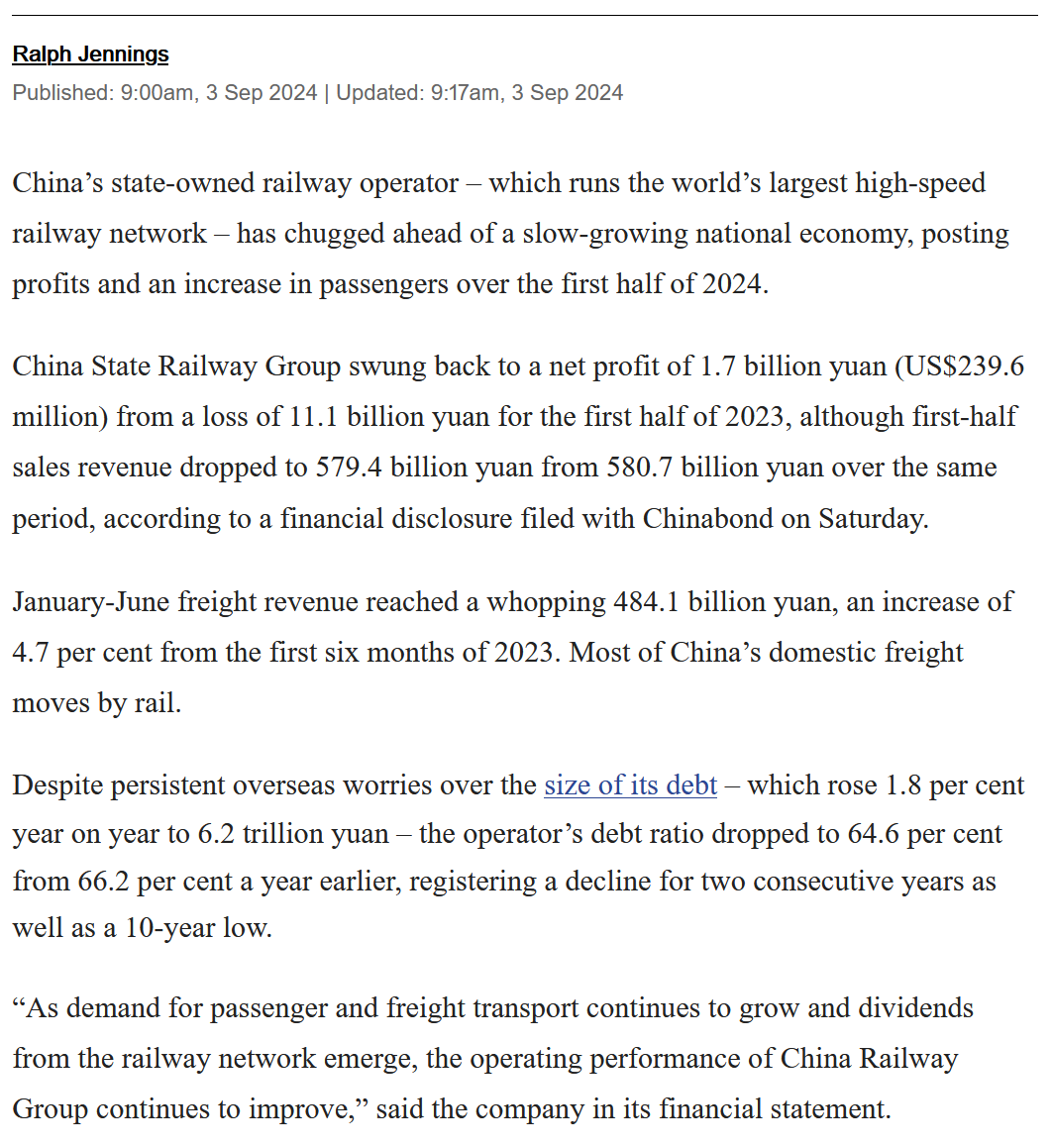Mfs seem to have forgotten that Chinese GDP PPP is already higher than the US
Chinese GDP: from making actual goods and services
US GDP: check out this spreadsheet that lets us charge rental fees on a toaster
Two accountants were walking through a park one day, when they came across a pile of dog shit.
"I will pay you 50$ to eat that." one said to the other.
And thusly the continued on, until they came across another pile of dog shit.
"I will pay you 50$ to eat that." said the accountant who still had the taste of dog shit in his mouth.
And on they went.
"Hey." said the other and stopped walking. "I feel like we both just ate dog shit and got nothing out of it."
The other accountant turned sharply towards his collague."Nonsense! The national GDP rose by 100 dollars!"
meaningless metric
Some peak comments
The difference between democracy and dictatorship is like a ceiling light versus a flashlight. The ceiling light won't shine evenly everywhere in a crowded room, some places might get less light and some places might be too obstructed to get any light at all, but all in all the room is brighter. Whereas with a flashlight you can point it at any part of the room you want and illuminate it, but the room as a whole isn't as bright.
I can feel my political understanding get better already. In taking this analogy seriously, I have come to understand that democracies ... uh ... huh. What is even the point here?
In particular, democratic republics are more stable due to having transitions of power happen peacefully, regularly, and frequently, which helps reduce corruption and, ideally, prevents leaders from being too disconnected from the people they govern.
Bro you live in the United States.
Yes, but a lot of China's troubles were going to happen. China stressed short-term GDP gains as opposed to playing the long game following 2008's crash. This was while Hu Jintao was in charge. So, while a ton of funds got thrown at infrastructure projects, a lot of them were for little more than vanity, if even that. China built an extensive high-speed rail network. But it consistently loses money.
Divine comedy.
Communism is like the sun. It is the natural order and everyone gets as much light as they need
Whereas with a flashlight you can point it at any part of the room you want and illuminate it, but the room as a whole isn't as bright.
Many of my flashlights (I own 3, not trying to brag) are brighter than my ceiling lights by a huge margin and quite easily illuminate a whole room. This analogy only really "works" if you're talking about a maglight from the 90s.
China built an extensive high-speed rail network. But it consistently loses money.
Literally a week ago (China State Railway Group includes high-speed rail as well):
Show
Source: https://www.scmp.com/economy/china-economy/article/3276871/chinas-railway-operator-brings-gravy-train-posting-profits-and-lowering-debt-ratios
Also, companies like Amazon and Uber made huge losses for YEARS, so they could increase market share and eventually use their size to incur massive profits later.
I wouldn't compare china's railways to amazon or uber. They don't need to make a profit in the first place. Dumbass neoliberals, despite proclaiming themselves as the clerics of capitalism don't even seem to understand that the only bad kind of debt for a government is foreign debt. And china has a massive trade surplus. They don't need to give a shit that the railways are making a loss.
I’m so incredibly confused by this argument lol. Do these people think the US is making any profits from roads? Oh right, the automakers and gas companies’ profits are what matters.
That last one especially is insane. “They only focused on short term profit, but also they built a major infrastructure network in that time, but it’s functional instead of profitable so that’s bad actually.”. Just complete whiplash.
I found a YouTube link in your comment. Here are links to the same video on alternative frontends that protect your privacy:
It is shit here but you should actually love it being shit because it is shit because if our librul democracy where you can choose between the polite imperialist right and the rude imperialist right. And because of that our shitty stuff is better than their good stuff.
Whereas with a flashlight you can point it at any part of the room you want and illuminate it, but the room as a whole isn't as bright.
If you take a decently bright flashlight and put it on the floor pointing up, it pretty much lights the whole room. Even a phone’s flash does a decent job at it.
In particular, democratic republics are more stable due to having transitions of power happen peacefully, regularly, and frequently, which helps reduce corruption and, ideally, prevents leaders from being too disconnected from the people they govern.
And how is that working out in practice?
It’s so stable that I have to screech at people to vote for a lady or else they’ll be executed in gas chambers by Dumpf and the world ends due to one person voted into power.
The difference between democracy and dictatorship is like a ceiling light versus a flashlight. The ceiling light won't shine evenly everywhere in a crowded room, some places might get less light and some places might be too obstructed to get any light at all, but all in all the room is brighter. Whereas with a flashlight you can point it at any part of the room you want and illuminate it, but the room as a whole isn't as bright.
I found a YouTube link in your comment. Here are links to the same video on alternative frontends that protect your privacy:
In particular, democratic republics are more stable due to having transitions of power happen peacefully, regularly, and frequently, which helps reduce corruption and, ideally, prevents leaders from being too disconnected from the people they govern.
This is pretty funny because I’ve seen brainwormed westerners write about how China is incredibly safe and stable, but because it’s ultra authoritarian so everyone is monitored and people are too scared to act out
democratic republics are more stable
And yet every election cycle you have to trot out how the bad candidate is a "threat to democracy" and today's election is the "most important of our lifetime".
Then there's also the issue of culture war that the bourgeois media and political class weaponizes, pitting worker against worker. The rhetoric is then directly responsible for violence and polticial instability of you so-called "stable" liberalism.
Ah yes, very stable.
The difference between democracy and dictatorship is like a ceiling light versus a flashlight. The ceiling light won't shine evenly everywhere in a crowded room, some places might get less light and some places might be too obstructed to get any light at all, but all in all the room is brighter. Whereas with a flashlight you can point it at any part of the room you want and illuminate it, but the room as a whole isn't as bright.
I can feel my political understanding get better already. In taking this analogy seriously, I have come to understand that democracies ... uh ... huh. What is even the point here?
Activating my lib-O-vision, I interpret this as saying that democracy leads to less efficient decision making due to the overhead of including everyone (the bit about some parts getting less light and some none at all) but everyone ultimately benefits (the entire room being brighter). Dictatorship has more efficient decision making because it's only one person calling the shots (the place the flashlight is pointed gets very illuminated), but only a small part of the room (the dictator's favored) gets illuminated by the person holding the flashlight (the dictator).
GDP is bullshit anyway, if a storm hits a city causing 200B of damage the repairs get counted to GDP but the destruction does not.
It's just a totally phony propaganda number with mutable definitions
what i love about this website is users with stupid funny usernames laying out brute knowledge unprompted, GOOD post.
I don't feel like having a huge convo on this atm but thanks sincerely for your post which makes good points. I just don't want you casting your pearls before swines lol
One thing I will say is that the fact that finance capital was able to change the way the Russians calculated the size of their economies to include bullshit like stock markets before going on to raid them is exactly what I mean when I say it's a bullshit made-up propaganda measure. Maybe that's not it's sole intended purpose but it is definitely used for that purpose. A dollar spent on a factory in china is counted the same as a dollar made from creating NFT apes.
It's a fake measure with real consequences in other words. I also don't think western economists know their asses from their elbows, and spending 15 minutes in an econ 101 class illustrates why. Following that shit to it's conclusion basically leads you to ancapistan.
poor people getting a nutritious meal and shelter does nothing for GDP and therefore bad.
building a kill house to train heavily armed and militarized police murder squads against your own citizens is good for GDP and therefore good.
neoliberal economic theory: it's just that easy.
I presume that whoever owns the infrastructure will be able to report the losses and so reduce the GDP calculations. Damage to homes will probably also play a part in the calculations as their values are tracked by banks and the government. For smaller personal assets, I don't think the value would be tracked. Also, the 200B damages counting towards GDP could have been spent elsewhere, so the storm wouldn't really increase GDP. It would also reduce personal incomes of city dwellers.
As much as we like to shit on bourgeois economists, I think even they at least know better than to pull a broken window fallacy with GDP calculations, since that is something you are taught even in econ 101.
The real thing that (nominal) GDP measures is purchasing power of countries relative to other countries on the international markets at current prices (assuming frictionless trade). I do think it is a useful number to denote a few things, like, 1. is the country in a recession, 2. where does this country stand wrt imperialism, 3. how developed the country is.
infrastructure is considered a 'stock' you measure it at any point in time.
GDP is a 'flow', total value of final goods and services measured over a year. so if a country has a bridge worth $100b, that won't be included in GDP since it already exists, it won't be shown when its destroyed/depreciates either. it is only measured for the year its built, no other year.
so if a storm hits, people lose jobs, homes, reduce consumption, GDP falls. to counter some of the effects, the Government injects money through jobs programs, stimulus checks, ppp loans etc which prevents some of the fall.
GDP is a ‘flow’, total value of final goods and services measured over a year. so if a country has a bridge worth $100b, that won’t be included in GDP since it already exists, it won’t be shown when its destroyed/depreciates either. it is only measured for the year its built, no other year.
Yeah, I don't know why I said that the destruction of the bridge would be counted. For GDP metrics, the product/service is assumed to have been consumed entirely in the year it was sold.
Reddit style comment on news like this:
I'm using "Rich Guy" metrics to interpret the economy from my position of "Not A Rich Guy" in a country with 40+ years of growing socioeconomic stratification that doesn't actually make anything except guns

Nah, a good chunk of r/neoliberal is firmly in the labor aristocracy or petit bourgeoise. I think these guys did a survey at some point and the typical subscriber a 30 something tech worker on the east/west coast.
Jesus that's a grim statistic
It's like a convention for people who will end up doing the office jobs for the Fifth Reich
what
material conditions and class interest determine politics
how could this be
The US doesn’t even make good guns most of the time these days.
The modern concept of GDP was first developed by Simon Kuznets for a 1934 U.S. Congress report, where he warned against its use as a measure of welfare
Hilarious because I'm reading "The Long Twentieth Century" which basically argues that there is a cycle of which power leads the capitalist world before being replaced by another capitalist power. Each power (Genoa, Netherlands, Great Britain, USA) began with an expansion of commercial and commodity production, which then reaches the limit of profits, before turning all excess capital towards financial expansion. Each financial expansion makes the capitalist class incredibly rich and prolongs their dominance, but sews the seeds for their end. It's during this financial expansion that the next capitalist power starts their commercial expansion and becomes "the world's factory."
The author shows that America's financial turn was during the late 70s and especially 80s. He doesn't draw this conclusion, but it's clear to me that China is the current capitalist power that's taken over the commercial role in shipping and manufacturing. Even though I think China is an AES, they still have a capitalist economy.
We always joke that the commies in China do capitalism better than capitalists, but it's demonstrably true. America has dominance right now due to financial networks, but that arrangement won't last much longer with the material dominance of the Chinese economy.
I am also reading the long 20th century. Haven't gotten that deep in it yet, but yeah, China does seem poised to become the new and final hegemon, given the historical trend of each capitalist hegemon being larger than the previous one.
I do kind of expect the book's analysis to be of limited quality, since they seem to be working off a bizarre and unmaterialistic definition of capitalism based on political power and commerce (a pre-marxist understanding). Maybe as I read along it will be cleared up.
Could you expand on what you mean by "unmaterialistic definition of capitalism"? I think the entire thesis is built around understanding the MCM cycle, and it says capitalism only becomes systemic to the entire mode of production under the British industrial expansion.
I really haven't read much of the book, which I should finish ASAP, so I am not really criticizing it, just expressing preliminary concerns.
it says capitalism only becomes systemic to the entire mode of production under the British industrial expansion.
This is kind of my problem here. Capitalism or capitalists are not something that meaningfully exist before the industrial revolution [1]. However, the book talks a lot about capitalist logics of state building, capitalist agencies, capitalist power and so on that existed well before the industrial revolution. This is because capital is conceived of as money with the power of expansion, either through MCM' or MM'.
We also are introduced to Braudel's conception of an anti-market of predators which is "the real home of capitalism". This layer presides over a market layer of "horizontal communications" and "automatic coordination usually links supply, demand and prices". This model seems to contradict the logic of the book, as money has the power of expansion via the market (second layer), and the third layer only emerges after the industrial revolution.
In either case, I feel like the concept of capitalism is being used unclearly. Furthermore, despite quoting Marx quite a bit, the author never even mentions labor value (or exchange value). The amount of focus on wage-labor, agriculture and demographics is also low, which I also find strange given the centrality of these things to any materialist analysis of world-capitalism.
All in all, it seems to me as if this book is about the inter-state politics of capitalism (a fine topic of study, I'm not saying it isn't), but it seems one sided. Maybe reading further in the book will clear things up for me.
[1] Up until that point, almost all of the surplus of any society is the amount of food leftover after all of the peasants/agricultural slaves are fed. This can be used to maintain a buffer, and feed a military/non-food producing portion of the population, but the accumulation of labor value in large quantities over many years can only occur when most of the population is not producing a good which perishes quickly.
Capitalism or capitalists are not something that meaningfully exist before the industrial revolution
I disagree here. The nascent of capitalism was grown within the old order of feudalism in small scale. Burghers/bourgeoisie operated within cities that were distinct in economy and governance from the rest of feudal world. Guilds and city councils were bourgeoisie organizations which codified the accumulation of capital. They weren't producing on a factory scale, but they weren't independent artisans either. Guild masters had dozens of employees under them who produced artisan goods in exchange for wage labor. While the majority of the population were agricultural workers, within select cities the urban population would turn surplus into capital. If it's a matter of definition you could call this proto-capitalism because it wasn't systemic to the entire economy, but a capitalist logic certainly dominated those select cities which allowed them to accumulate so much wealth. But I think if you have a hard cut off on capitalism beginning only with the industrial revolution, you're losing a lot of relevant conversation.
All in all, it seems to me as if this book is about the inter-state politics of capitalism
And I don't really disagree with this. The author doesn't go into too much detail about how things are produced.
I know that the bourgeoisie existed before the industrial revolution and had their own organizations. I would certainly call these proto-capitalistic. But I would not call the prevailing social order itself capitalism, much in the same way I wouldn't call the current social order socialism, even though proto-socialist elements exist today. Since the elements themselves also only exist as parts of a whole, I wouldn't call proto-capitalist elements as capitalistic, because the elements of a fully capitalist society are different from the elements that will later evolve into capitalism. For example, in regards to guilds, most guilds before capitalism proper did not rely on wage labor (as wage labor was heavily looked down upon before capitalism as being unfit for men). Wage labor could only explode with primitive accumulation, and only with the formation of reserve armies of labor does it take on the monstrous form that it has under capitalism.
If I come across as arguing over semantics, it's just that I find the way that the book uses the word "capitalism" confusing. I have pre-concieved notions of what the word means, and am not sure which ones I should drop or keep when reading a passage from the book.
a capitalist logic certainly dominated those select cities which allowed them to accumulate so much wealth
Yes, I do think this is a relevant dynamic.
"Nominal" is so stupid, it depends on exchange rate and not actual purchasing power.
Yeah, Im sure that basing trends off of a couple years of economic data as opposed to a literal decade of trends has never backfired.
As well, yeah, they have stopped building so many houses, but as others have said, GDP is a bullshit number anyways.
China's GDP PPP is something like $24 trillion and the US is like $18 trillion.. something along those lines I heard recently
Depending on who's measuring. China is significantly ahead regardless of source though
That was from the IMF which is owned by the US... I don't think they'd report it if there was any way they could spin it.
It looks like China overtook the US in 2017 for GDP PPP
https://www.imf.org/external/datamapper/PPPSH@WEO/CHN/USA?year=2017
Also I was wrong, it looks like the current numbers are China 19 trillion, US 15.5 trillion but I'm pretty sure I heard those original numbers somewhere recently
A Reddit link was detected in your comment. Here are links to the same location on alternative frontends that protect your privacy.
I wish I had saved and archived the thread where they though GDP was the sum of all money on earth. Makes the neoliberal fixation with GDP even funnier.
Seems to be true, it peaked in 2021
https://www.wolframalpha.com/input?i=china+gdp+%2F+usa+gdp+from+2015-2023
So if it declined nominally in 2021, but increased PPP, that implies purchasing power in China fell that year to a much greater extent than in the USA. Is that right?
No, it means that purchasing power in China rose more than in the US, which is literally what GDP PPP measures. A falling GDP but rising GDP PPP means that for some reason, your currency is being undervalued.
Any idea why China's currency is being undervalued? Was it because they were doing it on purpose? I remember Western press being mad at them claiming that awhile ago lol.
From what I understand this is because the renminbi is not a convertible currency*. Wether you're american, russian or chinese you can't easily buy and sell yuan on forex exchange markets. What this means is that when China accumulates dollars, it invests those abroad (historically the US, now not so much for obvious reasons). This drives up the demand for dollars, and means that China's trade surplus does not drive up the demand for yuan.
It's probably just a case of America's currency being overvalued, since china's gdp has only fallen wrt America. As for why America's currency is overvalued? Probably the result of the euro, the dollars main competitor, being shafted by the Ukraine war
To understand this a bit better, look at this chart comparing the dollar to rmb and this one against the euro showing the dollar's massive gain directly after the Ukraine war.
In fact, the dollar was in a big slump during covid times (likely because the americans increased their money supply the most, and also because the slowdown in global trade hurts the imperial hegemon the most), and recovered right in the early stages of the war.
In concequence, right now, nominally speaking, America underwent significant growth. More accurately, you could say that the Ukraine war restored America's power as the imperial hegemon after its corrosion during corona. This is also why liberal media and the DNC insit so much that the economy is doing great. From the perspective of the imperialists, it genuinely is.
This is why i love hexbear. Some crazy memes mixed with some high quality effort posts with links and everything.
https://www.wolframalpha.com/input?i=china+gdp+ppp+%2F+usa+gdp+ppp+from+2010-2023



















